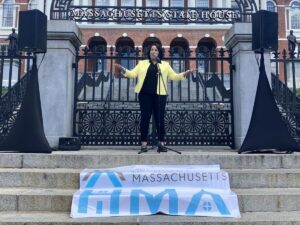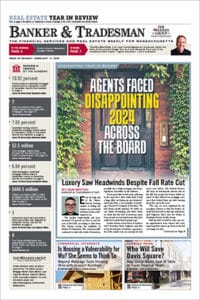
Lt. Gov. Kim Driscoll speaks during an Abundant Housing Massachusetts rally on Wednesday, May 29, 2024. Photo by Alison Kuznitz | State House News Service
Housing advocates and elected officials rallied Wednesday in support of a statewide policy to allow accessory dwelling units by right, and the state’s top housing official offered his “word on the street” about the timing of a major housing bill’s arrival in the House.
The ADU proposal, included in the $4.1 billion housing bond bill that Gov. Maura Healey filed in mid-October, could spark the development of more than 8,000 housing units over five years, administration officials estimate.
Jesse Kanson-Benanav, executive director of Abundant Housing Massachusetts, called ADUs a priority for the nonprofit, which helped advise the Healey administration on its sweeping housing plan.
“We need all the tools in the toolbox that we can get to build more homes across Massachusetts. ADUs is a no-brainer,” Kanson-Benanav told the News Service before a rally on the State House steps. “It’s a way for homeowners to generate some income, to help senior relatives, maybe family members with a disability, or children returning from college. It’s a gentle way to add more homes to more communities.”
Little Visible Progress on Major Bill
Housing and Livable Communities Secretary Ed Augustus praised the work of AHMA, which advocates for exclusionary zoning reform, transit-oriented housing, funding for public and subsidized housing, and tenant protections to prevent displacement.
Augustus told reporters that he heard the House will release its version of a housing bill in the “next week or two.”
“That’s what we’re hearing. I don’t have that definitively, but that’s the kind of word on the street,” Augustus said.
A spokesperson for House Speaker Ron Mariano declined to offer a timetable for House action on the bill, which is before the House Ways and Means Committee.
Housing affordability and supply was a major issue heading into the 2023-24 legislative session but a major bill has yet to emerge in the House or Senate. To have a shot at a new law, versions of the bill need to clear both branches and a compromise reached by July 31.
ADUs Called Bare Minimum
Lt. Gov. Kim Driscoll, who like Augustus also attended the roughly hour-long event, urged housing supporters – representing communities from various swaths of the state, including Greater Boston, Western Massachusetts and the North Shore – to speak with lawmakers about the importance of ADUs.
“If we can’t get accessory dwelling units done – hang up our housing card,” Driscoll said. “We’ve got to get accessory dwelling units more permissible in more communities to attract the type of housing we need. It will not cost the state anything and will build a pipeline of housing. We need to think about ways we can ensure this bill is not watered down, that it has the strengths that we need to meet this moment.”
Introducing a minimum statewide standard for ADUs would help overcome the current patchwork of zoning regulations, Kanson-Benanav said. Healey’s plan paves the way for ADUs that are less than 900 square feet by right.
“The industry of builders, designers, contractors who will help homeowners build ADUs on their properties hasn’t sprouted up in Massachusetts because rather than having to understand one consistent statewide minimum standard, they have to potentially understand 150 or maybe 351 different bylaws,” Kanson-Benanav said.
Cathy Mercado, executive director of the Merrimack Valley Housing Partnership, lamented that an ADU ordinance failed to clear the Lowell City Council last year.
“We need to focus not so much in the suburban areas – where some of the places have ADU ordinance – but in the Gateway Cities, we really need to work on the Gateway Cities, such as Lowell,” said Mercado, referring to midsize cities that are considered ripe for economic growth. “ADU is a small-hanging fruit, you would think, but it’s not so true. We need to really do more advocacy work.”
After attending college, Franklin Town Councilor Cobi Frongillo said he was able to afford to move back to his hometown because his parents had built an ADU. Frongillo said the unit gave him privacy and dignity to enjoy his own living space with a separate entrance.
“We need more housing. We also need more housing types,” Frongillo said. “It’s different types of housing – accessory dwelling units, low-income housing, public housing, middle-income housing, duplexes, triplexes, rental vouchers, rental assistance that’s gonna make this system work.”
With roughly two months remaining of formal lawmaking this session, Driscoll told reporters her top legislative priorities are housing, economic development and the fiscal 2025 budget – three bills that most Beacon Hill insiders believe will pass by the end of July.
Driscoll, asked how she can prevent the administration’s housing bill from becoming “watered down,” invoked events like Wednesday’s rally that “bring people together.”
“This is being driven by the administration, but there are a lot of people’s voices in communities who are experiencing the lack of housing, the unaffordability of housing, trying to buy a home if you’re making a good income, or trying to keep your head above water,” Driscoll said. “So it’s affecting everyone – the business community, as well. They have been a key partner in this effort because they can’t attract talent, and that probably wasn’t the case three or five years ago, but it is now.”
Broader Transfer Tax Proposal Pitched
In March, Mariano expressed an openness to considering a local option transfer tax on certain real estate transactions to grow the affordable housing supply. Healey’s proposal would impose a fee of 0.5 to 2 percent on the portion of a property sale above $1 million or the median single-family home sale price for a county, whichever is greater. Earlier this month, Mariano said the policy is “not as popular” as he thought, and that it may be slowing down his branch from moving forward with housing legislation.
Driscoll stressed to reporters that the transfer fee is an important tool for cities and towns.
“That’s a resource for them. It’s a local option,” the lieutenant governor said. “We believe in it. That’s why we included it in the bill, and we’re hopeful that it will come out in the end.”
Sen. Jo Comerford and Rep. Mike Connolly have legislation that offers an alternative transfer fee structure, which they say is designed to support greater affordable housing efforts in communities that lack real estate transactions above $1 million.
Augustus was asked Wednesday if he was open to proposals to lower the threshold.
“We’ve proposed our version of policy changes and funding that we think will work, and we’ve laid out what the numbers would look like in terms of news units created or units preserved,” Augustus said. “But we’re always open to having conversations about ways to make it better or the other ideas that could be added to the mix that could advance the goal of creating more housing and taking some of the pressure off. So I think we’re very open to conversations with the Legislature as they kind of take a crack at the bill in the coming weeks.”






